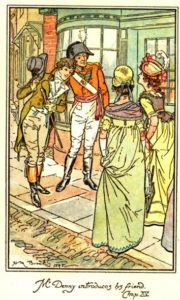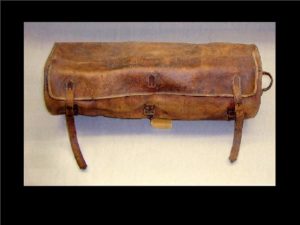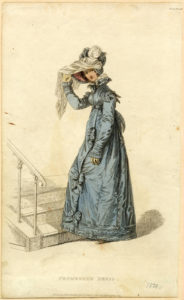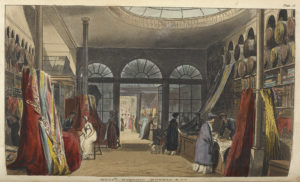
Lydia is introduced to Mr. Wickham (Brock)
“When Lydia went away, she promised to write very often and very minutely to her mother and Kitty; but her letters were always long expected, and always very short. Those to her mother contained little else than that they were just returned from the library, where such and such officers had attended them, and where she had seen such beautiful ornaments as made her quite wild; that she had a new gown, or a new parasol, which she would have described more fully, but was obliged to leave off in a violent hurry, as Mrs. Forster called her, and they were going to the camp; and from her correspondence with her sister, there was still less to be learnt — for her letters to Kitty, though rather longer, were much too full of lines under the words to be made public.”
– Pride and Prejudice
Lydia gave a little skip of delight as she walked along Brighton’s best shopping street, clinging on to Wickham’s arm. “I am glad we are all by our own selves, today, aren’t you, my dearest? We don’t need any body else, when we’re with the person we love, I always think.”
“We’re hardly alone, in this crowd, are we,” he commented, “but here is the very shop I want. I hope there are not too many people here before us, I am in no mood to wait.”
“This place deals in men’s goods,” Lydia pouted. ”I thought you were going to buy me some new finery. I have almost nothing to wear. My father is so unkind, he says he will not send me another cent while I am in Brighton.”
“That is too bad,” said Wickham swiftly. “Have you spent all he gave you, then?”
“Yes, and I have borrowed five pounds from Mrs. Forster.”
“Then we are in like case,” he murmured, gazing into the shop window.
“And you owe me a new gown, you know you do, after making that dreadful great slit in my muslin worked one. Who would lie down on a divan wearing a sword! I am quite angry at you, dear Wickham.”
“I suppose I had made a few too many toasts to the corps, that is true,” he admitted. “But you are a toothsome little bit, Lydia, and you cannot blame me.”
“You always want your way with me,” she dimpled. “Even at a party, and in an alcove where we could almost be seen!”
“Well, well, I’ll buy you something, when I finish my business here. Ah, that portmanteau in the window – exactly the right sort. Let us go in.”

18th century portmanteau
“There you are, sir, the very thing for a man on the move! You see how the straps can be altered, so you can carry the portmanteau in your hand, or upon your back. Excellent for shirts and other attire, especially if rolled; and for carrying reading material to occupy you on a journey,” the obliging clerk mentioned as he displayed the long log-shaped leather case.
“Yes, it is just what I require. I like to travel lightly. I will take it now, and you may send in the bill to me care of the _____ Corps.”
“Indeed, sir, it is a pleasure to serve any of our fine visiting militia men.”
“Are we going to Scotland now, my dear Wickham?” asked Lydia, watching him swing the bag jauntily as they left the shop.
“Scotland?”
“Why, Gretna Green, as we talked of. Where we can be married, you know.”
He shrugged. “I suppose we might as well go there as any where else. I have made this town too hot to hold me.”
“And you are hot to hold,” she laughed. “But how did you do that?”
“Merely some debts of honour – most inconvenient – but you need not bother your head about them.”
“Very well, I won’t. Now, there! Here is the shop for me, and I declare, that pelisse will do very nicely for traveling, too. It is very pretty, is not it? And quite ready-made, so it will not need altering. We can take it right away. I chuse that as my present, Wickham.”
He looked at the costume carefully. “Do you know, you have not chosen badly. That would be quite a useful garment – you can cover yourself with it in the coach, and you will not need to bring much else, which will make things easy. Let us go in and see about it, and that will finish our purchases.”
Lydia was delighted with the pelisse, in a dark blue velvet, and with the novelty of hearing Wickham praise her for being practical, something she had never been told by any one before. “But perhaps you do know about clothing, if not much beside,” he considered, “since you and your mother seldom do talk of anything else.”

18th century pelisse, Ackerman’s Repository
There were words exchanged when Lydia also begged for a new bonnet to go with the pelisse, but Wickham finally shrugged, “In for a penny, in for a pound; and you will wear it upon your head, so it won’t weigh us down, if you do insist on coming along. Though I beg you to think better of it,” and he turned back to the clerk to order the goods to be taken, and the bill to be sent.
The young pair continued their promenade tete a tete, with Lydia immediately asking what he meant by trying to persuade her not to accompany him.
“I thought it was all settled! We were going to Gretna Green together!”
“Nothing is settled, except that I must leave Brighton at once. I have determined to take the midnight coach to London. Beyond that I do not know.”
“But you promised me we would elope! So exciting! I cannot wait to tell my family, and all my friends. What a joke it will be!”
“Elope – but, Lydia, you see I have no money. And you are poor enough. You could bring nothing to a marriage, and we must have some means.”
“I can bring myself, can I not? You know you like my company,” and she nestled up clingingly to his arm.
“I like you in some ways,” he said carelessly. “But it is high time for us to be provident, and even if I cannot marry for great wealth, it would be folly to take on a wife that is penniless.”
“But I am not penniless,” Lydia told him. “My father will give me a thousand pounds upon marriage I am sure, and my uncle Gardiner is quite rich – ten to one he will support us.”
“And then there is Darcy,” said Wickham thoughtfully.
“Mr. Darcy? That friend of Bingley’s? What has he to do with it?”
“I suspect him of liking your sister Elizabeth. He might be persuaded to do something for us, if we play our cards right,” said Wickham shrewdly.
“You are almost too deep for me, Wickham,” Lydia sighed. “But never mind. Only think what fun it will be, our being in lodgings alone together! What cuddles we shall have. Do you know, I cannot bear to think of you being lonely.”
“I have a friend in London who may be able to take us in,” he reflected. “Mrs. Younge runs a boarding house – not a very respectable boarding house, but it would be a good place to conceal ourselves, and she should be able to keep us for awhile.”
“She sounds perfect!”
“Mind you, she is a woman who lets out her fore room and lies backwards, if you get my meaning; and if you come along with me you will sacrifice being respectable yourself, in a manner of speaking. You may as well know that, Lydia.”
“Oh, I don’t care about that! We will surely be married some time or other, being as much in love as we are.”
“It’s true, you do have friends who might be moved to help us,” he mused.
“Well then, now it is settled, is it not? And we will go to Gretna Green?”
“Perhaps, some time or other, if you are determined.”
“I am!”
“Very well then, look here. You slip out of the Forsters’ lodgings at eleven tonight, just go down the dark stairs with only a few things in a bag – the rest of your clothes can be sent on later. I will be waiting for you in the garden; and we will walk to the coaching station.”
“Oh, this is so exciting!” she squealed, jumping up and down as she clutched his arm harder than ever.
Moments later they fell in with a set of officers, including Colonel and Mrs. Forster, as well as Wickham’s particular friend Denny, and all proceeded together to an eating-house where they feasted on chops and ale, and made merry until the Forsters and their guests said their good nights and retired to their lodgings.
Soon the house was dark, and every one was asleep but Lydia. Sitting up in her room, she wrote a note to her hostess, by the light of one candle:
“My dear Harriet,
You will laugh when you know where I am gone, and I cannot help laughing myself at your surprise tomorrow morning, as soon as I am missed. I am going to Gretna Green, and if you cannot guess with who, I shall think you a simpleton, for there is but one man in the world I love, and he is an angel. I should never be happy without him, so think it no harm to be off…”

18th century shopping (British Library)

10 comments
Skip to comment form
OMG! Just how dense is Lydia? I suppose I could understand her going with Wickham if he whispered words of love to her, but here he just about told her he would only take her if there was a chance of him getting money out of someone! She’s obviously only hearing what she wishes to hear with not a thought for her family!
Author
Well, that’s Lydia, isn’t it? Jane Austen has done such a magnificent job of showing us exactly this, it’s easy and a pleasure to follow up her implications! Thanks, Glynis.
Oh, this is PERFECT! Dimwitted Lydia refuses to hear what Wicky is bluntly telling her, even when she sees that he has no money. I wonder if Lydia would ever grow up, or if she would become an old woman still trying to flirt with officers and acting like an ingenue. Diana, you have captured her exactly as Jane Austen wrote! Well done!
Author
Aw, thanks so much, June! Will Lydia ever grow up? You ask an interesting question. I always imagined her ending up like a Mrs. Price, poor, discontented, hopeless, with too many children. But Lydia has exuberant high spirits that I don’t think Mrs. Price (or her sisters Lady Bertram and Mrs. Norris, for that matter) ever had. So perhaps she will end up as a boozy, battered over the hill woman of pleasure?
Well, Lydia is young and inexperienced with men outside her small circle of family friends. So, although “stupid “ to not really understand Wickham, even when he tells her outright, I think she represents many young girls who are infatuated with love and filter out what they don’t want to hear in hopes things will change once they “catch” their guy. I know even a bit older and wiser than Lydia, in my late teens, I experienced similar feelings and that’s what makes this story universally appealing. Unfortunately, we often learn the lesson too late.
I hope this becomes a novel or at least a novella. Thanks for sharing.
Author
Thanks, Meg. I’ll tell you a secret. I’ve always enjoyed Lydia, and enjoyed channeling her, partly because I was once a rambunctious 15-year-old myself, and so I can see bits of me in her! No, I didn’t run off with a Wickham. Alas, my first husband was rather less charming! But yes, I did have a teenage marriage, and yes, that dizzy heedlessness of Lydia’s…I recognize it!
Oh Lydia! What a foolish young girl she was. I really enjoyed this glimpse into Wickham and Lydia deciding to run off together. 🙂
Thanks, Lucy! I do enjoy writing me some Lydia. She is so exasperating, hilariously the opposite of what a proper Jane Austen young lady ought to be!
Yikes! Lydia didn’t listen to anything Wickham said. He told her! Who was responsible for the cost of her pelisse and bonnet? Colonel Forster?
Author
Hi Chris, well, Lydia didn’t care who paid. And Wickham was clearing out of town without paying his bills. However, we know that in due course, his debts were settled by Mr. Darcy, in making the arrangements that resulted in Wickham marrying Lydia. So Wickham and Lydia started out married life fairly, with no debts and him joining the regular army. How long that lasted, Jane Austen does not tell us!